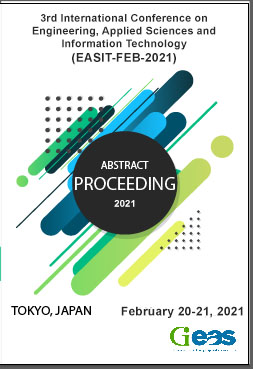
EASIT Proceedings
Copyright © GIEAS. All rights reserved
EASIT Proceeding
Volume 3, Pages 1-18
3rd International Conference on “Engineering, Applied Sciences and Information Technology” (EASIT 2021)
February 20-21, 2021 Tokyo, Japan
Edited by Dr. Ahmed Saddam
Track: Business Management & Economic Studies
The Effect of Woman Health Nursing Problem-based Learning on Selfefficacy, Self-directed Learning and Problem-solving Ability
Pages 1-7
Cha Mi-Youn
Abstract
This study examined the effect of woman health nursing problem-based learning program for nursing students on self-efficacy, self-directed learning and problem-solving ability. It is a quasi-experimental study for pre/post-test design of a nonequivalent control group. An experimental group and a control group had 43 participants each for this study (n=86). This test operated the problem-based learning (PBL) program for the experimental group and gave a lecture instruction class to the control group. The two groups were surveyed to check the effect of the program on self-efficacy, self-directed learning and problem-solving ability at the same time by the pre/post-test. Thus, it was found out that the problem-solving ability was p= .001 and the self-efficacy was p=.005, which meant that the problem-based learning (PBL) program had significantly influenced. Therefore, it is implied that the problem-based learning (PBL) program can be helpful to problemsolving ability and self-efficacy of woman health nursing learning.This study examined the effect of woman health nursing problem-based learning program for nursing students on self-efficacy, self-directed learning and problem-solving ability. It is a quasi experimental study for pre/post-test design of a nonequivalent control group. An experimental group and a control group had 43 participants each for this study (n=86). This test operated the problem-based learning (PBL) program for the experimental group and gave a lecture instruction class to the control group. The two groups were surveyed to check the effect of the program on self-efficacy, self-directed learning and problem-solving ability at the same time by the pre/post-test. Thus, it was found out that the problem-solving ability was p= .001 and the self-efficacy was p=.005, which meant that the problem-based learning (PBL) program had significantly influenced. Therefore, it is implied that the problem-based learning (PBL) program can be helpful to problemsolving ability and self-efficacy of woman health nursing learning.
Track: Engineering & Technology Studies
Evaluation of a Non-linguistic Tourism Information System in the Tama Area of Tokyo
Pages 8-18
Shinya ABE, Ryo SASAKI, Kayoko YAMAMOTO
Abstract
Despite continuing efforts to translate information systems as part of preparations for hosting foreign visitors in Japan, the language barrier cannot be completely overcome by translation alone because it is not possible to convey important information in a sufficient number of languages. To address this issue, we developed a system that provides only non-linguistic tourism information. The defining characteristic of our system is its user interface comprising only public information symbols, images, and Arabic numerals. In this paper, we discuss field tests conducted to evaluate the system in the Tama area of Tokyo and demonstrate that the system’s response performance is sufficient for practical use.
